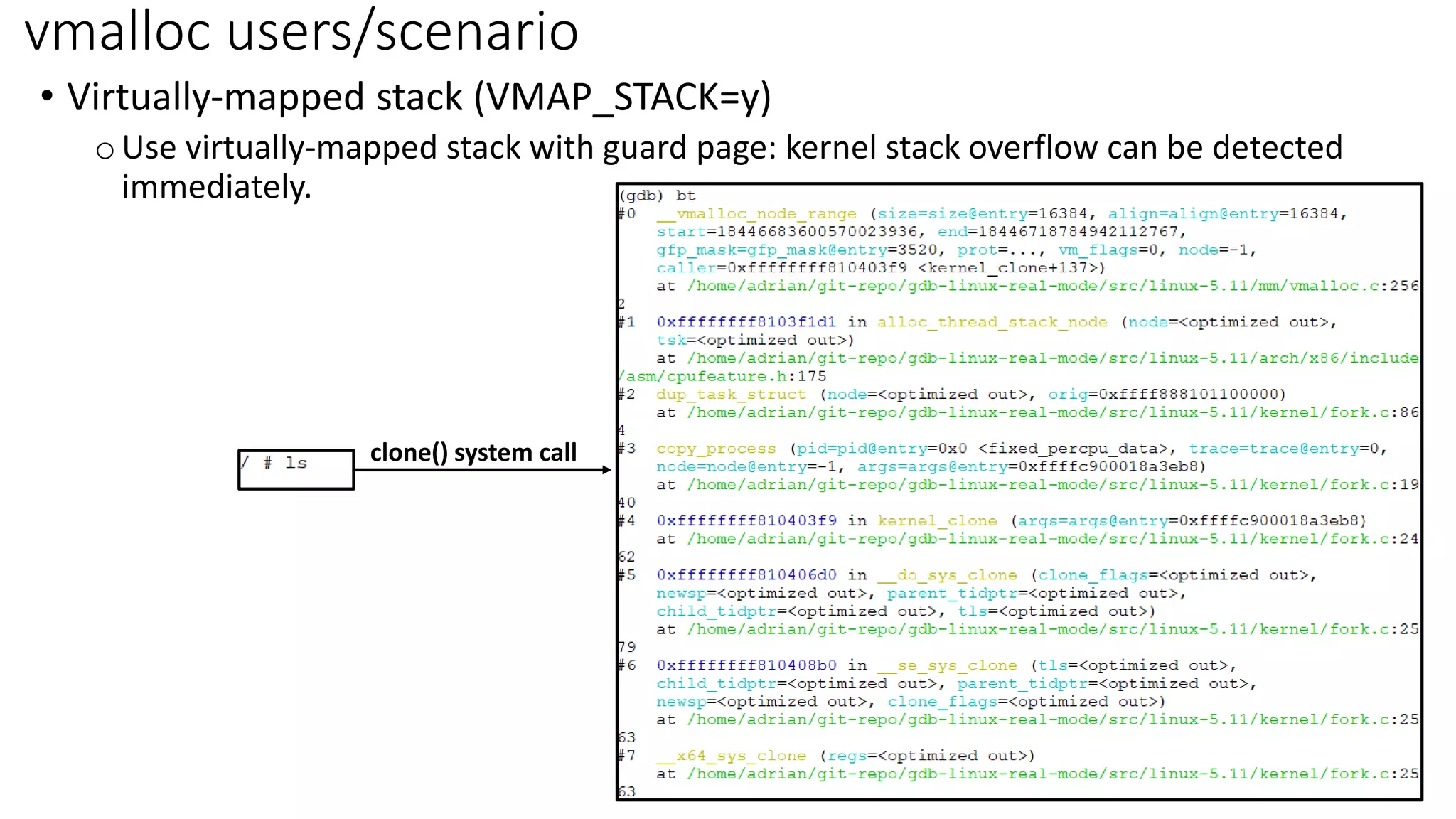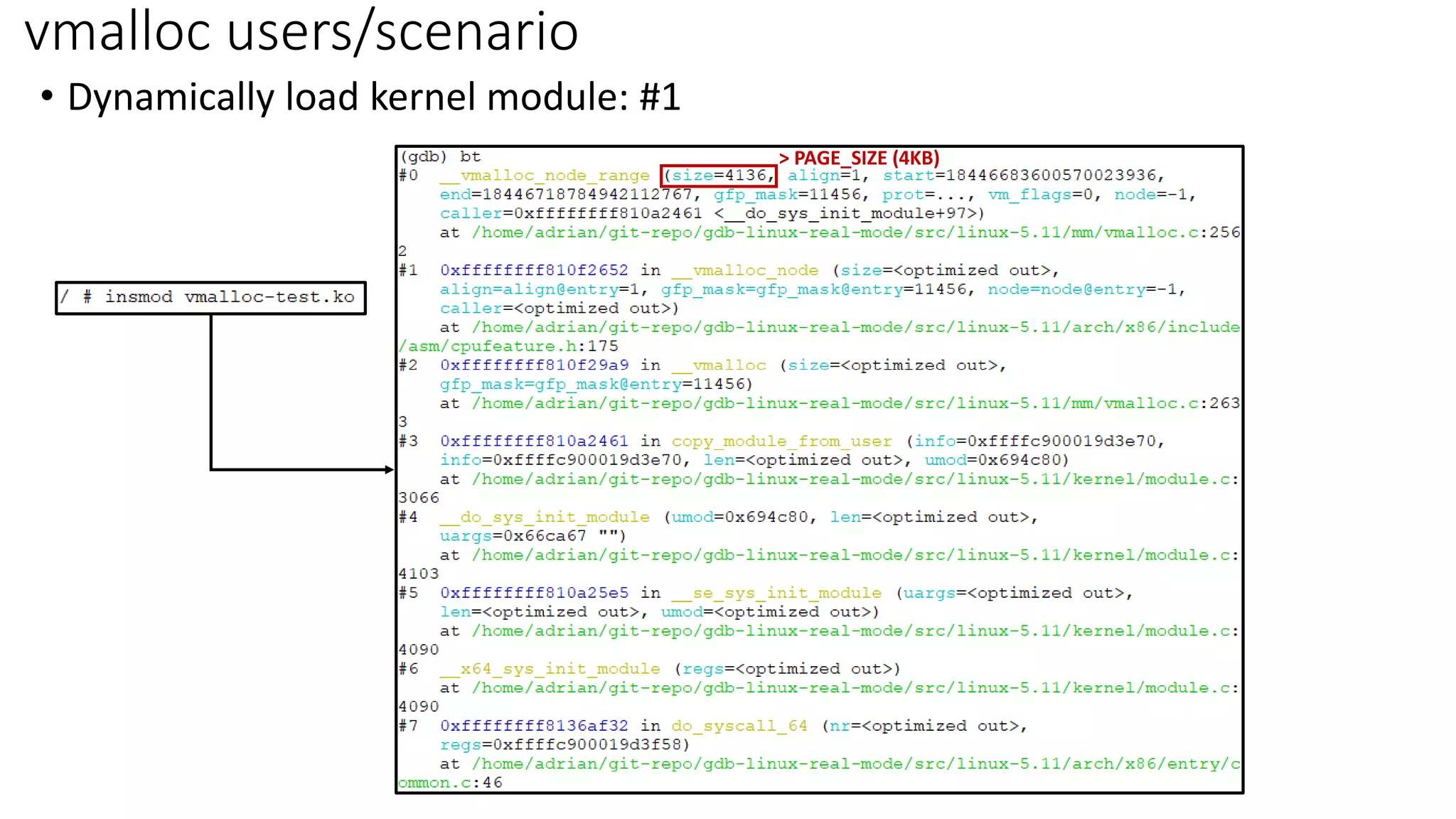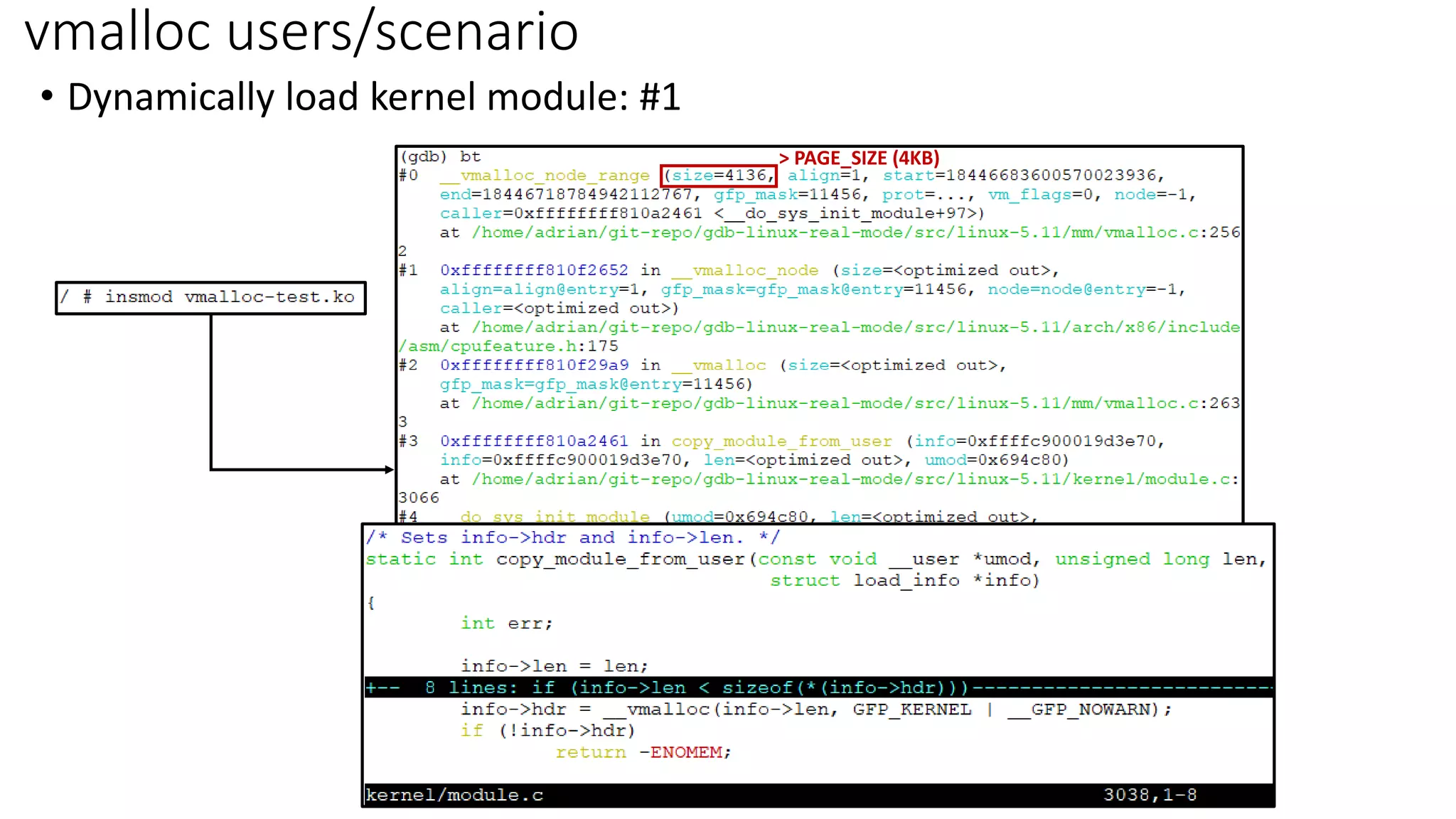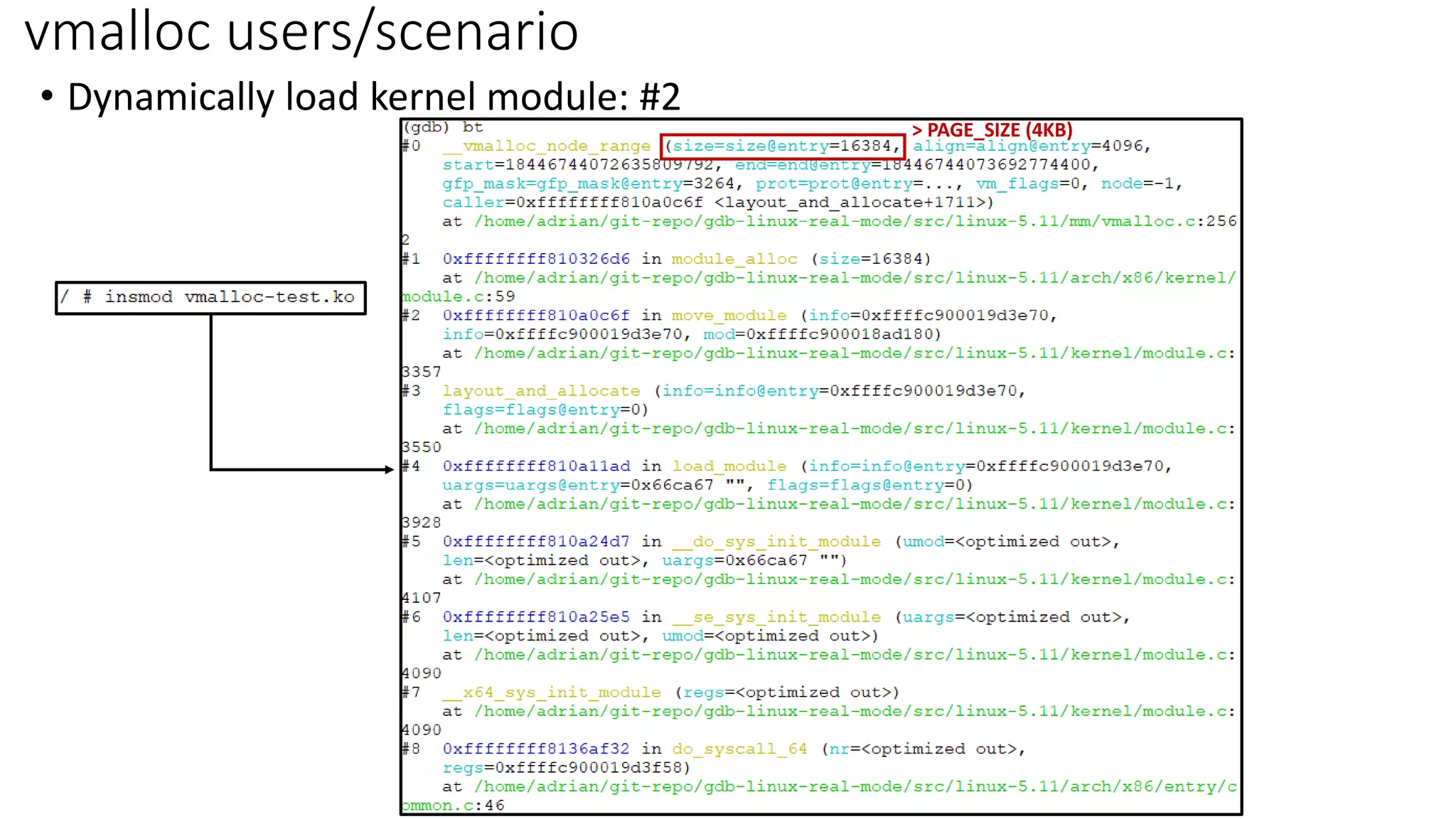The document discusses memory allocation in the Linux kernel, specifically detailing the implementations of malloc through brk() and the implications of using mmap() versus brk() based upon allocation sizes. It highlights the distinctions between kmalloc (for contiguous memory) and vmalloc (for non-contiguous memory) along with their interactions with the slab allocator. Additionally, the document provides insights into the memory management process related to program launches and how the kernel handles address spaces and heap configurations.

![Agenda
• Memory Allocation in Linux
• malloc -> brk() implementation in Linux Kernel
oWill *NOT* focus on glibc malloc implementation: You can read this link: malloc internal
• vmalloc: Non-contiguous memory allocation
• [Note] kmalloc has been discussed here: Slide #88 of Slab Allocator in Linux
Kernel](https://image.slidesharecdn.com/mallocvmallocinlinux-221205070506-74fe014b/75/malloc-vmalloc-in-Linux-2-2048.jpg)
![Memory Allocation in Linux
Buddy System
alloc_page(s), __get_free_page(s)
Slab Allocator
kmalloc/kfree
glibc: malloc/free
brk/mmap
. . .
vmalloc
User Space
Kernel Space
Hardware
• Balance between brk() and mmap()
• Use brk() if request size < DEFAULT_MMAP_THRESHOLD_MIN (128 KB)
o The heap can be trimmed only if memory is freed at the top end.
o sbrk() is implemented as a library function that uses the brk() system call.
o When the heap is used up, allocate memory chunk > 128KB via brk().
▪ Save overhead for frequent system call ‘brk()’
• Use mmap() if request size >= DEFAULT_MMAP_THRESHOLD_MIN (128 KB)
o The allocated memory blocks can be independently released back to the system.
o Deallocated space is not placed on the free list for reuse by later allocations.
o Memory may be wasted because mmap allocations must be page-aligned; and the
kernel must perform the expensive task of zeroing out memory allocated.
o Note: glibc uses the dynamic mmap threshold
o Detail: `man mallopt`
[glibc] malloc
• kmalloc: Contiguous memory allocation
• vmalloc: Non-contiguous memory allocation
o Scenario: memory allocation size > PAGE_SIZE (4KB)
o Allocate virtually contiguous memory
▪ Physical memory might NOT be contiguous
kmalloc & vmalloc](https://image.slidesharecdn.com/mallocvmallocinlinux-221205070506-74fe014b/75/malloc-vmalloc-in-Linux-3-2048.jpg)
![kmalloc & slab (Recap)
struct kmem_cache
*kmalloc_caches[NR_KMALLOC_TYPES][KMALLOC_SHIFT_HIGH + 1]
struct kmem_cache
*kmalloc_caches[KMALLOC_NORMAL][]
kmem_cache
__percpu *cpu_slab
*node[MAX_NUMNODES]
kmem_cache
__percpu *cpu_slab
*node[MAX_NUMNODES]
kmem_cache
__percpu *cpu_slab
*node[MAX_NUMNODES]
kmem_cache
__percpu *cpu_slab
*node[MAX_NUMNODES]
kmem_cache
__percpu *cpu_slab
*node[MAX_NUMNODES]
NULL
kmalloc-96
0
1
2
3
4
13
kmalloc-192
kmalloc-8
kmalloc-16
…
kmalloc-8192
struct kmem_cache
*kmalloc_caches[KMALLOC_RECLAIM][]
NULL
kmalloc-96
0
1
2
3
4
13
kmalloc-192
kmalloc-8
kmalloc-16
…
kmalloc-8192
__GFP_RECLAIMABLE
struct kmem_cache
*kmalloc_caches[KMALLOC_DMA][]
NULL
kmalloc-96
0
1
2
3
4
13
kmalloc-192
kmalloc-8
kmalloc-16
…
kmalloc-8192
__GFP_DMA
Check create_kmalloc_caches() &kmalloc_info Referece (slideshare): Slab Allocator in Linux Kernel](https://image.slidesharecdn.com/mallocvmallocinlinux-221205070506-74fe014b/75/malloc-vmalloc-in-Linux-4-2048.jpg)
![malloc() -> brk() implementation in
Linux Kernel
• Quick view: Process Address Space – Heap
• sys_brk – Call path
• [From scratch] Launch a program: load_elf_binary() in Linux kernel
o VMA change observation
o Heap (brk or program break) configuration
• [Program Launch] strace observation: heap – brk()
• strace observation: allocate space via malloc()
o If the heap space is used up, how about allocation size when calling malloc()->brk?
• glibc: malloc implementation for memory request size](https://image.slidesharecdn.com/mallocvmallocinlinux-221205070506-74fe014b/75/malloc-vmalloc-in-Linux-5-2048.jpg)
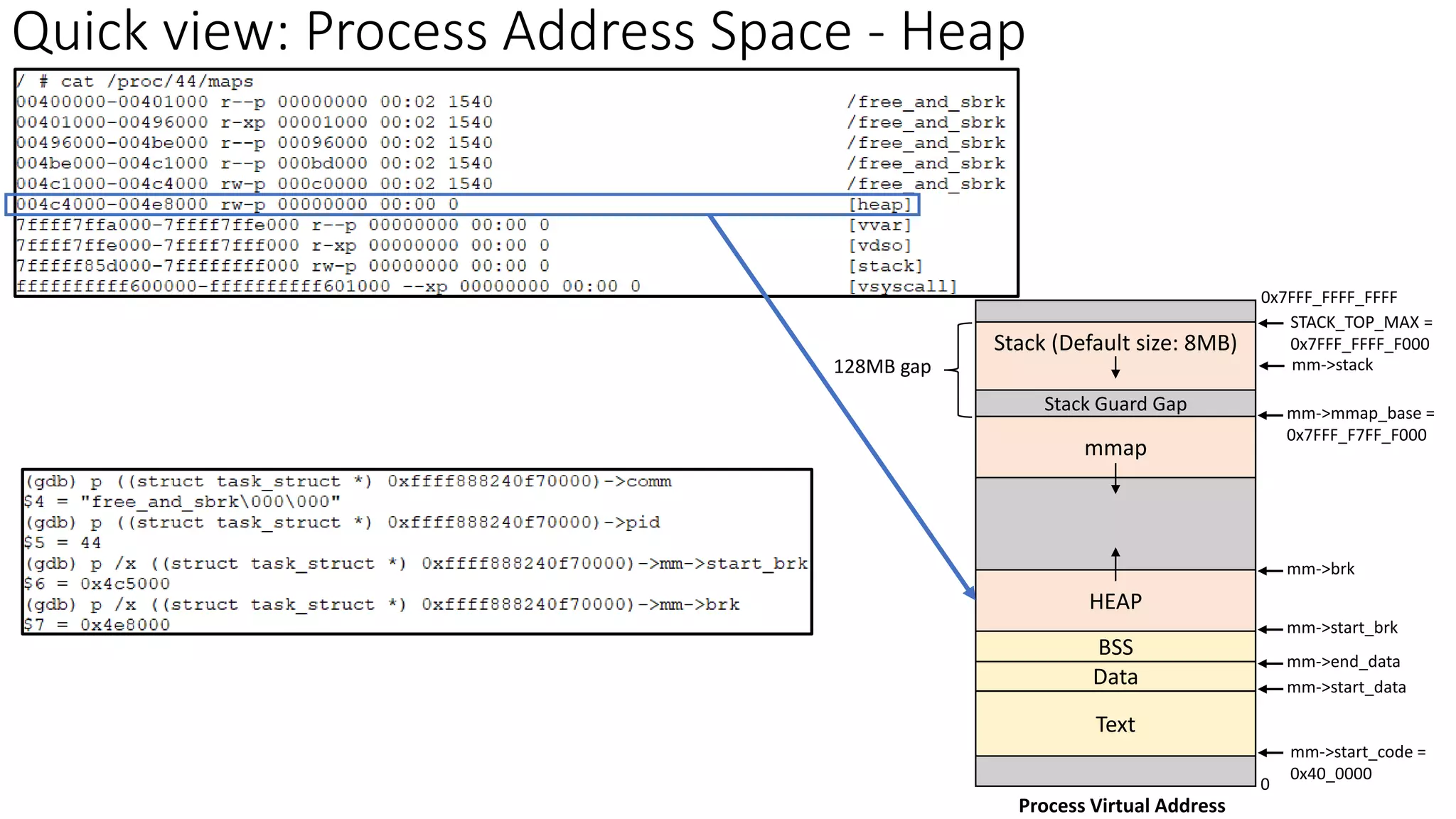
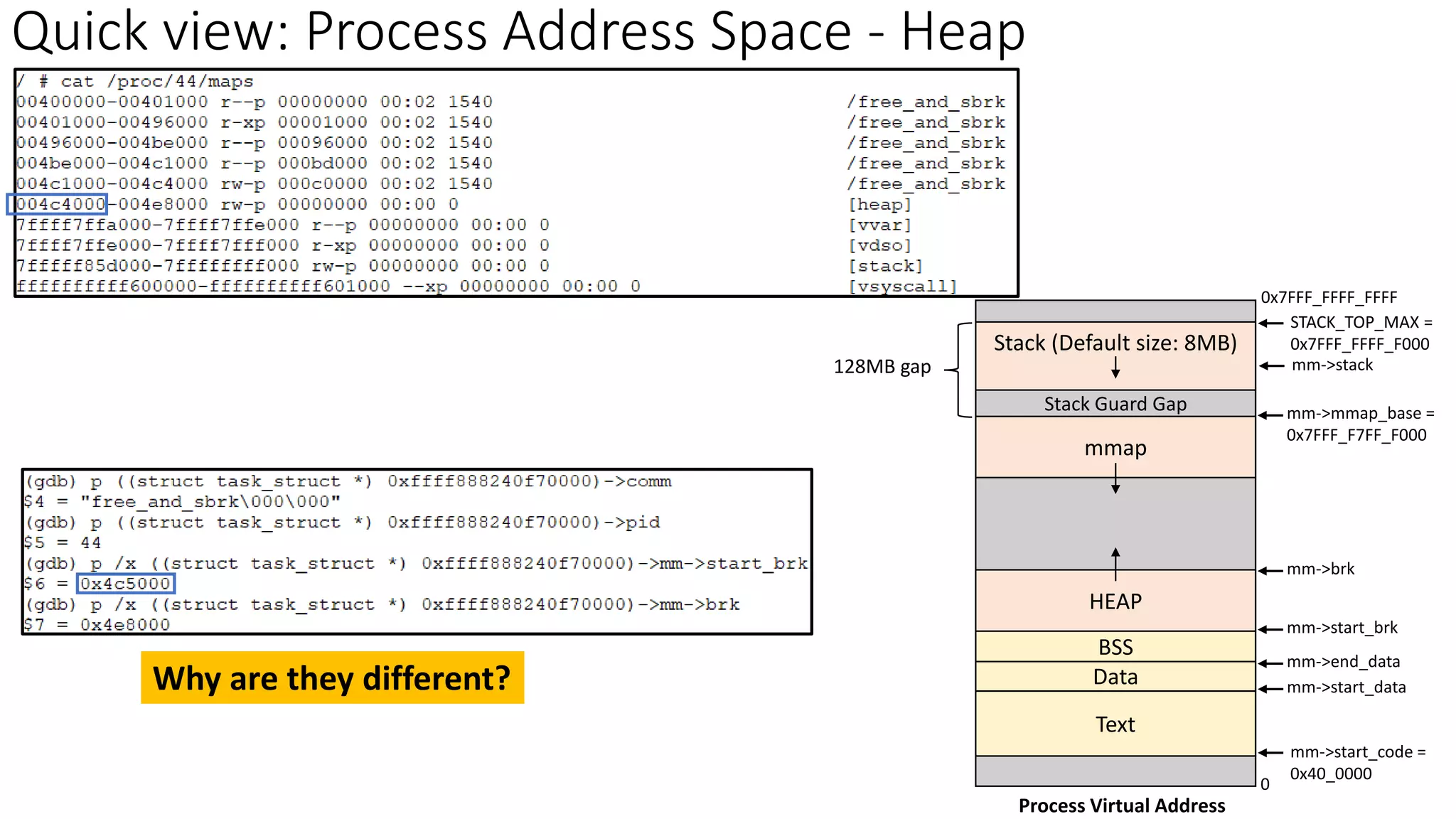
![sys_brk – Call path
sys_brk
newbrk = PAGE_ALIGN(brk)
oldbrk = PAGE_ALIGN(mm->brk)
__do_munmap
shrink brk if brk <= mm->brk
do_brk_flags
mm->brk = brk
mm_populate
mm->def_flags & VM_LOCKED != 0
can expand the existing
anonymous mapping
vma_merge
vm_area_alloc
cannot expand the existing
anonymous mapping
return mm->brk
if brk < mm->start_brk
__mm_populate
populate_vma_page_range
__get_user_pages
follow_page_mask
return newbrk
mm_populate
faultin_page
handle_mm_fault
Find if the page is populated
The page is NOT populated yet
[By default] Heap (or brk) space is on-demand page](https://image.slidesharecdn.com/mallocvmallocinlinux-221205070506-74fe014b/75/malloc-vmalloc-in-Linux-8-2048.jpg)
![vma: R
vm_start =
0x400000
vm_end =
0x401000
vma: R, E
vm_start =
0x401000
vm_end =
0x496000
vma: R
vm_start =
0x496000
vm_end =
0x4be000
GAP
vma: R, W
vm_start =
0x4be000
vm_end =
0x4c4000
GAP
vma (vvar)
vm_start =
0x7ffff7ffa000
vm_end =
0x7ffff7ffe000
vma (vdso)
vm_start =
0x7ffff7ffe000
vm_end =
0x7ffff7fff000
vma (stack)
vm_start =
0x7fffff85d000
vm_end =
0x7ffffffff000
GAP
[From scratch] Launch a program: load_elf_binary() in Linux kernel
# ./free_and_sbrk 1 1
load_elf_binary()
Kernel](https://image.slidesharecdn.com/mallocvmallocinlinux-221205070506-74fe014b/75/malloc-vmalloc-in-Linux-9-2048.jpg)
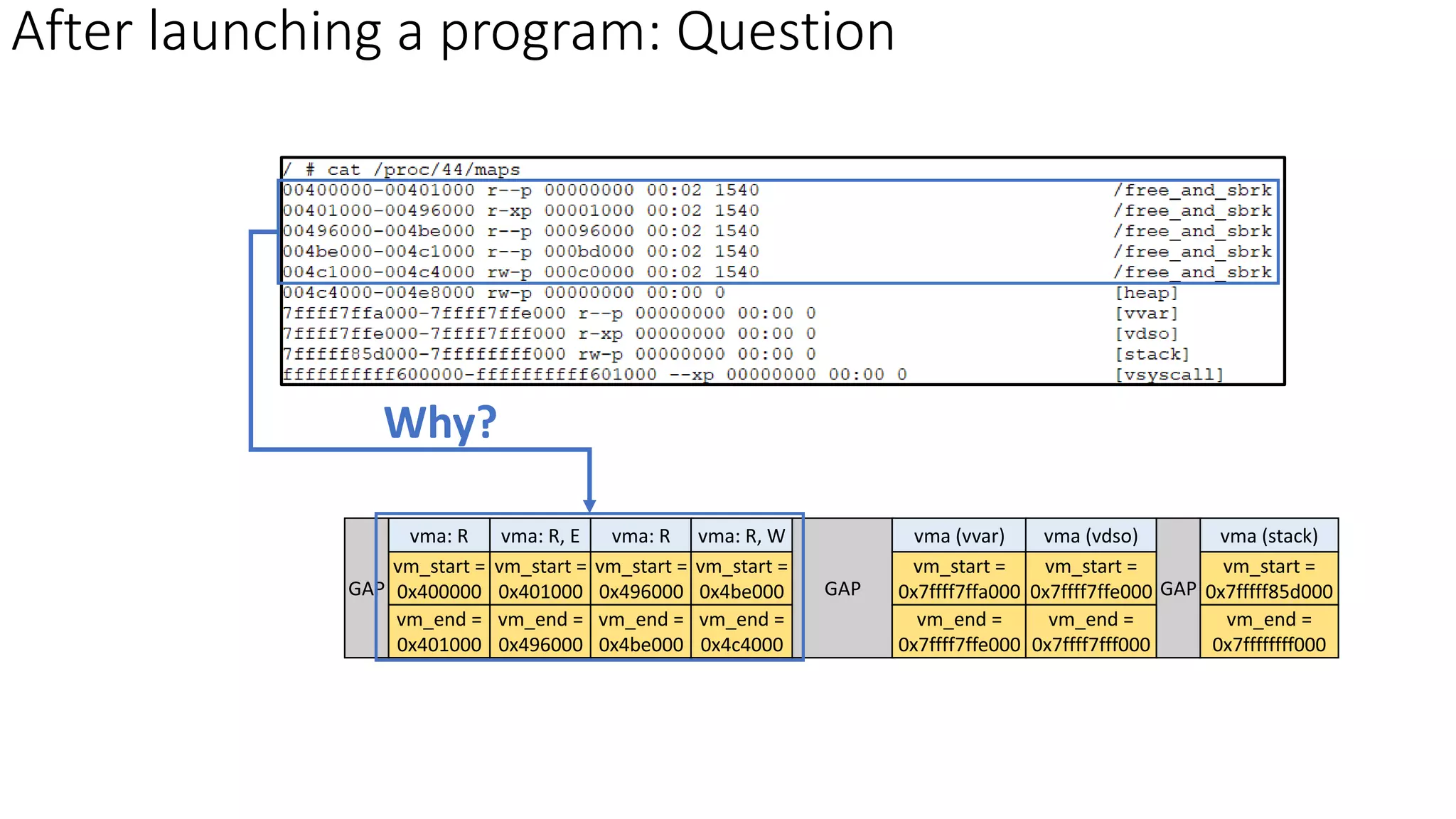
![# ./free_and_sbrk 1 1
vma: R
vm_start =
0x400000
vm_end =
0x401000
vma: R, E
vm_start =
0x401000
vm_end =
0x496000
vma: R
vm_start =
0x496000
vm_end =
0x4be000
GAP
vma: R, W
vm_start =
0x4be000
vm_end =
0x4c4000
GAP
vma (vvar)
vm_start =
0x7ffff7ffa000
vm_end =
0x7ffff7ffe000
vma (vdso)
vm_start =
0x7ffff7ffe000
vm_end =
0x7ffff7fff000
vma (stack)
vm_start =
0x7fffff85d000
vm_end =
0x7ffffffff000
GAP
load_elf_binary
set_brk
do_brk_flags
can expand the existing
anonymous mapping
vm_brk_flags
vma_merge
vm_area_alloc
cannot expand the existing
anonymous mapping
[From scratch] Launch a program: load_elf_binary() – Heap Configration
mm->{start_brk, brk} = end](https://image.slidesharecdn.com/mallocvmallocinlinux-221205070506-74fe014b/75/malloc-vmalloc-in-Linux-11-2048.jpg)
![# ./free_and_sbrk 1 1
vma: R
vm_start =
0x400000
vm_end =
0x401000
vma: R, E
vm_start =
0x401000
vm_end =
0x496000
vma: R
vm_start =
0x496000
vm_end =
0x4be000
GAP
vma: R, W
vm_start =
0x4be000
vm_end =
0x4c4000
GAP
vma (vvar)
vm_start =
0x7ffff7ffa000
vm_end =
0x7ffff7ffe000
vma (vdso)
vm_start =
0x7ffff7ffe000
vm_end =
0x7ffff7fff000
vma (stack)
vm_start =
0x7fffff85d000
vm_end =
0x7ffffffff000
GAP
load_elf_binary
set_brk
do_brk_flags
can expand the existing
anonymous mapping
vm_brk_flags
vma_merge
vm_area_alloc
cannot expand the existing
anonymous mapping
mm->{start_brk, brk} = end
vma (heap)
vm_start =
0x4c4000
vm_end =
0x4c5000
[From scratch] Launch a program: load_elf_binary() – Heap Configration](https://image.slidesharecdn.com/mallocvmallocinlinux-221205070506-74fe014b/75/malloc-vmalloc-in-Linux-12-2048.jpg)
![vm_start =
0x400000
vm_end =
0x401000
vm_start =
0x401000
vm_end =
0x496000
vm_start =
0x496000
vm_end =
0x4be000
GAP
vm_start =
0x4be000
vm_end =
0x4c4000
GAP
vma (vvar)
vm_start =
0x7ffff7ffa000
vm_end =
0x7ffff7ffe000
vma (vdso)
vm_start =
0x7ffff7ffe000
vm_end =
0x7ffff7fff000
vma (stack)
vm_start =
0x7fffff85d000
vm_end =
0x7ffffffff000
GAP
load_elf_binary
set_brk
do_brk_flags
can expand the existing
anonymous mapping
vm_brk_flags
vma_merge
vm_area_alloc
cannot expand the existing
anonymous mapping
vma (heap)
vm_start =
0x4c4000
vm_end =
0x4c5000
mm->brk = mm->start_brk
= 0x4c5000
vma: R vma: R, E vma: R vma: R, W
[From scratch] Launch a program: load_elf_binary() – Heap Configration
mm->{start_brk, brk} = end](https://image.slidesharecdn.com/mallocvmallocinlinux-221205070506-74fe014b/75/malloc-vmalloc-in-Linux-13-2048.jpg)
![vm_start =
0x400000
vm_end =
0x401000
vm_start =
0x401000
vm_end =
0x496000
vm_start =
0x496000
vm_end =
0x4be000
GAP
vm_start =
0x4be000
vm_end =
0x4c4000
GAP
vma (vvar)
vm_start =
0x7ffff7ffa000
vm_end =
0x7ffff7ffe000
vma (vdso)
vm_start =
0x7ffff7ffe000
vm_end =
0x7ffff7fff000
vma (stack)
vm_start =
0x7fffff85d000
vm_end =
0x7ffffffff000
GAP
load_elf_binary
set_brk
do_brk_flags
can expand the existing
anonymous mapping
vm_brk_flags
vma_merge
vm_area_alloc
cannot expand the existing
anonymous mapping
vma (heap)
vm_start =
0x4c4000
vm_end =
0x4c5000
mm->brk = mm->start_brk
= 0x4c5000
vma: R vma: R, E vma: R vma: R, W
[From scratch] Launch a program: load_elf_binary() – Heap Configration
mm->{start_brk, brk} = end
Why?](https://image.slidesharecdn.com/mallocvmallocinlinux-221205070506-74fe014b/75/malloc-vmalloc-in-Linux-14-2048.jpg)
![vm_start =
0x400000
vm_end =
0x401000
vm_start =
0x401000
vm_end =
0x496000
vm_start =
0x496000
vm_end =
0x4be000
GAP
vm_start =
0x4be000
vm_end =
0x4c4000
GAP
vma (vvar)
vm_start =
0x7ffff7ffa000
vm_end =
0x7ffff7ffe000
vma (vdso)
vm_start =
0x7ffff7ffe000
vm_end =
0x7ffff7fff000
vma (stack)
vm_start =
0x7fffff85d000
vm_end =
0x7ffffffff000
GAP
load_elf_binary
set_brk
do_brk_flags
can expand the existing
anonymous mapping
vm_brk_flags
vma_merge
vm_area_alloc
cannot expand the existing
anonymous mapping
vma (heap)
vm_start =
0x4c4000
vm_end =
0x4c5000
mm->brk = mm->start_brk
= 0x4c5000
vma: R vma: R, E vma: R vma: R, W
[From scratch] Launch a program: load_elf_binary() – Heap Configration
mm->{start_brk, brk} = end
elf_bss
elf_brk](https://image.slidesharecdn.com/mallocvmallocinlinux-221205070506-74fe014b/75/malloc-vmalloc-in-Linux-15-2048.jpg)
![vm_start =
0x400000
vm_end =
0x401000
vm_start =
0x401000
vm_end =
0x496000
vm_start =
0x496000
vm_end =
0x4be000
GAP
vm_start =
0x4be000
vm_end =
0x4c4000
GAP
vma (vvar)
vm_start =
0x7ffff7ffa000
vm_end =
0x7ffff7ffe000
vma (vdso)
vm_start =
0x7ffff7ffe000
vm_end =
0x7ffff7fff000
vma (stack)
vm_start =
0x7fffff85d000
vm_end =
0x7ffffffff000
GAP
load_elf_binary
set_brk
do_brk_flags
can expand the existing
anonymous mapping
vm_brk_flags
vma_merge
vm_area_alloc
cannot expand the existing
anonymous mapping
vma (heap)
vm_start =
0x4c4000
vm_end =
0x4c5000
mm->brk = mm->start_brk = 0x4c5000
vma: R vma: R, E vma: R vma: R, W
[From scratch] Launch a program: load_elf_binary() – Heap Configration
mm->{start_brk, brk} = end
elf_bss
elf_brk
range(elf_bss, elf_brk): bss space](https://image.slidesharecdn.com/mallocvmallocinlinux-221205070506-74fe014b/75/malloc-vmalloc-in-Linux-16-2048.jpg)
![[Program Launch] strace observation: heap – brk()
vma: R
vm_start =
0x400000
vm_end =
0x401000
vma: R, E
vm_start =
0x401000
vm_end =
0x496000
vma: R
vm_start =
0x496000
vm_end =
0x4be000
GAP
vma: R, W
vm_start =
0x4be000
vm_end =
0x4c4000
GAP
vma (vvar)
vm_start =
0x7ffff7ffa000
vm_end =
0x7ffff7ffe000
vma (vdso)
vm_start =
0x7ffff7ffe000
vm_end =
0x7ffff7fff000
vma (stack)
vm_start =
0x7fffff85d000
vm_end =
0x7ffffffff000
GAP
vma (heap)
vm_start =
0x4c4000
vm_end =
0x4c7000
mm->brk = 0x4c61c0
mm->start_brk = 0x4c5000
Demand paging: Allocate a physical page when a page fault occurs
sys_brk
newbrk = PAGE_ALIGN(brk)
oldbrk = PAGE_ALIGN(mm->brk)
__do_munmap
shrink brk if brk <= mm->brk
do_brk_flags
mm->brk = brk
mm_populate
mm->def_flags & VM_LOCKED != 0
can expand the existing
anonymous mapping
vma_merge
vm_area_alloc
cannot expand the existing
anonymous mapping
return mm->brk
if brk < mm->start_brk](https://image.slidesharecdn.com/mallocvmallocinlinux-221205070506-74fe014b/75/malloc-vmalloc-in-Linux-17-2048.jpg)
![vm_start =
0x400000
vm_end =
0x401000
vm_start =
0x401000
vm_end =
0x496000
vm_start =
0x496000
vm_end =
0x4be000
GAP
vm_start =
0x4be000
vm_end =
0x4c4000
GAP
vma (vvar)
vm_start =
0x7ffff7ffa000
vm_end =
0x7ffff7ffe000
vma (vdso)
vm_start =
0x7ffff7ffe000
vm_end =
0x7ffff7fff000
vma (stack)
vm_start =
0x7fffff85d000
vm_end =
0x7ffffffff000
GAP
vma (heap)
vm_start =
0x4c4000
vm_end =
0x4c7000
mm->brk = 0x4c61c0
mm->start_brk = 0x4c5000
Demand paging: Allocate a physical page when a page fault occurs
vma: R vma: R, E vma: R vma: R, W
[Program Launch] strace observation: heap – brk()](https://image.slidesharecdn.com/mallocvmallocinlinux-221205070506-74fe014b/75/malloc-vmalloc-in-Linux-18-2048.jpg)
![vm_start =
0x400000
vm_end =
0x401000
vm_start =
0x401000
vm_end =
0x496000
vm_start =
0x496000
vm_end =
0x4be000
GAP
vm_start =
0x4be000
vm_end =
0x4c4000
GAP
vma (vvar)
vm_start =
0x7ffff7ffa000
vm_end =
0x7ffff7ffe000
vma (vdso)
vm_start =
0x7ffff7ffe000
vm_end =
0x7ffff7fff000
vma (stack)
vm_start =
0x7fffff85d000
vm_end =
0x7ffffffff000
GAP
vma (heap)
vm_start =
0x4c4000
vm_end =
0x4e8000
mm->brk = 0x4e8000
mm->start_brk = 0x4c5000
Demand paging: Allocate a physical page when a page fault occurs
sys_brk
newbrk = PAGE_ALIGN(brk)
oldbrk = PAGE_ALIGN(mm->brk)
__do_munmap
shrink brk if brk <= mm->brk
do_brk_flags
mm->brk = brk
mm_populate
mm->def_flags & VM_LOCKED != 0
can expand the existing
anonymous mapping
vma_merge
vm_area_alloc
cannot expand the existing
anonymous mapping
return mm->brk
if brk < mm->start_brk
vma: R vma: R, E vma: R vma: R, W
[Program Launch] strace observation: heap – brk()](https://image.slidesharecdn.com/mallocvmallocinlinux-221205070506-74fe014b/75/malloc-vmalloc-in-Linux-19-2048.jpg)
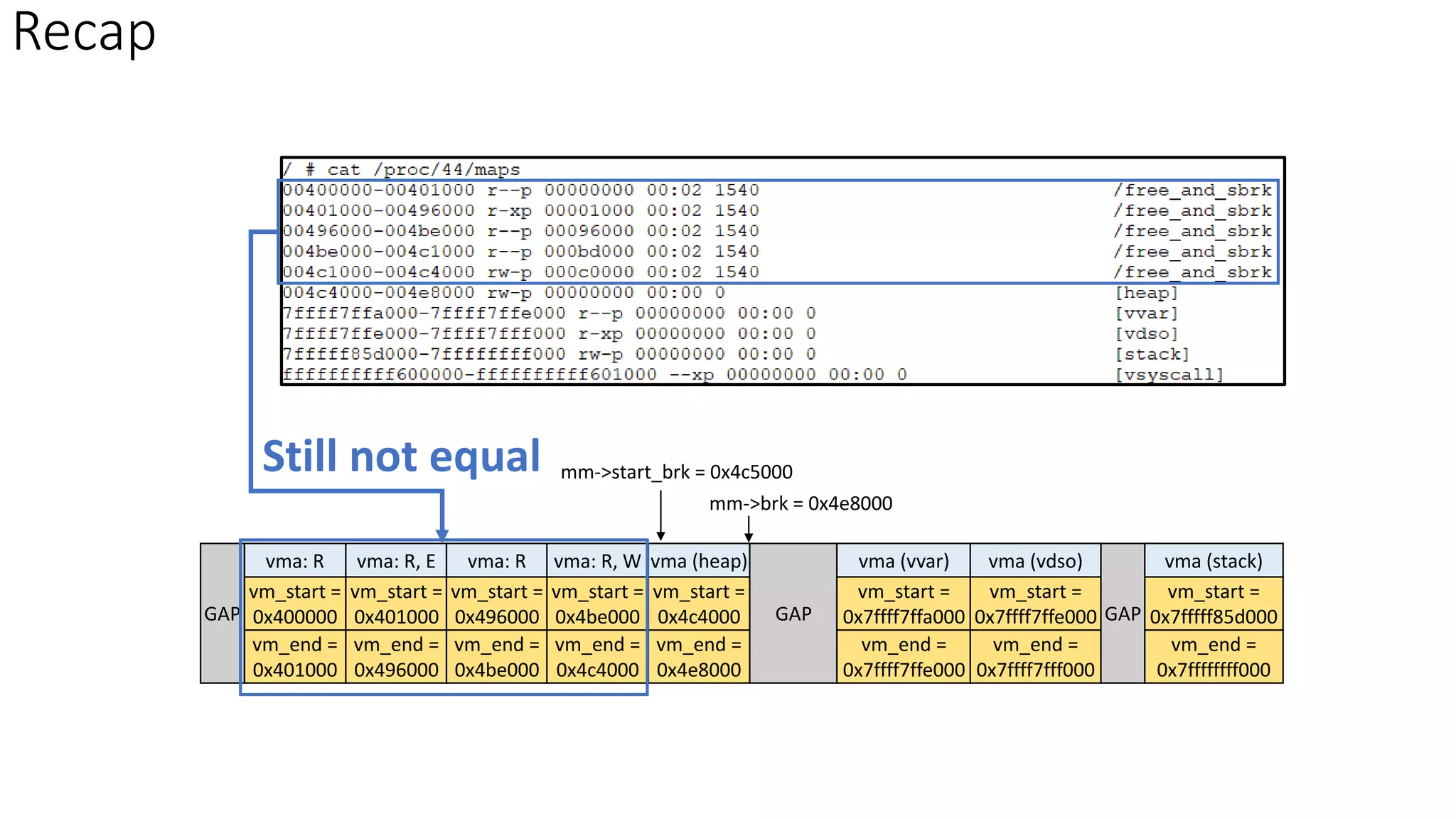
![[Program Launch] strace observation: mprotect()
vm_start =
0x400000
vm_end =
0x401000
vm_start =
0x401000
vm_end =
0x496000
vm_start =
0x496000
vm_end =
0x4be000
GAP
vm_start =
0x4be000
vm_end =
0x4c4000
GAP
vma (vvar)
vm_start =
0x7ffff7ffa000
vm_end =
0x7ffff7ffe000
vma (vdso)
vm_start =
0x7ffff7ffe000
vm_end =
0x7ffff7fff000
vma (stack)
vm_start =
0x7fffff85d000
vm_end =
0x7ffffffff000
GAP
vma (heap)
vm_start =
0x4c4000
vm_end =
0x4e8000
mm->brk = 0x4e8000
mm->start_brk = 0x4c5000
mprotect
split_vma vma_merge
Split this vma
vma: R vma: R, E vma: R vma: R, W](https://image.slidesharecdn.com/mallocvmallocinlinux-221205070506-74fe014b/75/malloc-vmalloc-in-Linux-21-2048.jpg)
![vm_start =
0x400000
vm_end =
0x401000
vm_start =
0x401000
vm_end =
0x496000
vm_start =
0x496000
vm_end =
0x4be000
GAP
vm_start =
0x4be000
vm_end =
0x4c4000
GAP
vma (vvar)
vm_start =
0x7ffff7ffa000
vm_end =
0x7ffff7ffe000
vma (vdso)
vm_start =
0x7ffff7ffe000
vm_end =
0x7ffff7fff000
vma (stack)
vm_start =
0x7fffff85d000
vm_end =
0x7ffffffff000
GAP
vma (heap)
vm_start =
0x4c4000
vm_end =
0x4e8000
mm->brk = 0x4e8000
mm->start_brk = 0x4c5000
R/W permission
vma: R vma: R, E vma: R vma: R, W
[Program Launch] strace observation: mprotect()](https://image.slidesharecdn.com/mallocvmallocinlinux-221205070506-74fe014b/75/malloc-vmalloc-in-Linux-22-2048.jpg)
![vm_start =
0x400000
vm_end =
0x401000
vm_start =
0x401000
vm_end =
0x496000
vm_start =
0x496000
vm_end =
0x4be000
GAP
vm_start =
0x4be000
vm_end =
0x4c1000
GAP
vma (vvar)
vm_start =
0x7ffff7ffa000
vm_end =
0x7ffff7ffe000
vma (vdso)
vm_start =
0x7ffff7ffe000
vm_end =
0x7ffff7fff000
vma (stack)
vm_start =
0x7fffff85d000
vm_end =
0x7ffffffff000
GAP
vma (heap)
vm_start =
0x4c4000
vm_end =
0x4e8000
mm->brk = 0x4e8000
mm->start_brk = 0x4c5000
vma: R, W
vm_start =
0x4c1000
vm_end =
0x4c4000
mprotect
split_vma vma_merge
vma split
vma: R vma: R, E vma: R vma: R
[Program Launch] strace observation: mprotect()](https://image.slidesharecdn.com/mallocvmallocinlinux-221205070506-74fe014b/75/malloc-vmalloc-in-Linux-23-2048.jpg)
![vm_start =
0x400000
vm_end =
0x401000
vm_start =
0x401000
vm_end =
0x496000
vm_start =
0x496000
vm_end =
0x4be000
GAP
vm_start =
0x4be000
vm_end =
0x4c1000
GAP
vma (vvar)
vm_start =
0x7ffff7ffa000
vm_end =
0x7ffff7ffe000
vma (vdso)
vm_start =
0x7ffff7ffe000
vm_end =
0x7ffff7fff000
vma (stack)
vm_start =
0x7fffff85d000
vm_end =
0x7ffffffff000
GAP
vma (heap)
vm_start =
0x4c4000
vm_end =
0x4e8000
mm->brk = 0x4e8000
mm->start_brk = 0x4c5000
vm_start =
0x4c1000
vm_end =
0x4c4000
match
vma: R, W
vma: R vma: R, E vma: R vma: R
[Program Launch] strace observation: mprotect()](https://image.slidesharecdn.com/mallocvmallocinlinux-221205070506-74fe014b/75/malloc-vmalloc-in-Linux-24-2048.jpg)
![strace observation: allocate space via malloc() #1
[Init stage]
0x4e8000 – 0x4c7000 = 0x21000
(132KB: 33 pages)
• Balance between brk() and mmap()
• Use brk() if request size < DEFAULT_MMAP_THRESHOLD_MIN (128 KB)
o The heap can be trimmed only if memory is freed at the top end.
o sbrk() is implemented as a library function that uses the brk() system call.
o When the heap is used up, allocate memory chunk > 128KB via brk().
▪ Save overhead for frequent system call ‘brk()’
• Use mmap() if request size >= DEFAULT_MMAP_THRESHOLD_MIN (128 KB)
o The allocated memory blocks can be independently released back to the system.
o Deallocated space is not placed on the free list for reuse by later allocations.
o Memory may be wasted because mmap allocations must be page-aligned; and the
kernel must perform the expensive task of zeroing out memory allocated.
o Note: glibc uses the dynamic mmap threshold
o Detail: `man mallopt`
[glibc] malloc](https://image.slidesharecdn.com/mallocvmallocinlinux-221205070506-74fe014b/75/malloc-vmalloc-in-Linux-25-2048.jpg)
![strace observation: allocate space via malloc() #2
[Init stage] 0x21000 (132KB: 33 pages)
• Balance between brk() and mmap()
• Use brk() if request size < DEFAULT_MMAP_THRESHOLD_MIN (128 KB)
o The heap can be trimmed only if memory is freed at the top end.
o sbrk() is implemented as a library function that uses the brk() system call.
o When the heap is used up, allocate memory chunk > 128KB via brk().
▪ Save overhead for frequent system call ‘brk()’
• Use mmap() if request size >= DEFAULT_MMAP_THRESHOLD_MIN (128 KB)
o The allocated memory blocks can be independently released back to the system.
o Deallocated space is not placed on the free list for reuse by later allocations.
o Memory may be wasted because mmap allocations must be page-aligned; and the
kernel must perform the expensive task of zeroing out memory allocated.
o Note: glibc uses the dynamic mmap threshold
o Detail: `man mallopt`
[glibc] malloc
Current program break is used
up: allocate another 132KB
malloc.c
Heap space allocation from malloc(): Allocate memory chunk > 128KB via brk()](https://image.slidesharecdn.com/mallocvmallocinlinux-221205070506-74fe014b/75/malloc-vmalloc-in-Linux-26-2048.jpg)
![Memory Allocation in Linux – brk() detail
Buddy System
alloc_page(s), __get_free_page(s)
Slab Allocator
kmalloc/kfree
brk or mmap
. . .
vmalloc
User Space
Kernel Space
Hardware
• Balance between brk() and mmap()
• Use brk() if request size < DEFAULT_MMAP_THRESHOLD_MIN (128 KB)
o The heap can be trimmed only if memory is freed at the top end.
o sbrk() is implemented as a library function that uses the brk() system call.
o When the heap is used up, allocate memory chunk > 128KB via brk().
▪ Save overhead for frequent system call ‘brk()’
• Use mmap() if request size >= DEFAULT_MMAP_THRESHOLD_MIN (128 KB)
o The allocated memory blocks can be independently released back to the system.
o Deallocated space is not placed on the free list for reuse by later allocations.
o Memory may be wasted because mmap allocations must be page-aligned; and the
kernel must perform the expensive task of zeroing out memory allocated.
o Note: glibc uses the dynamic mmap threshold
o Detail: `man mallopt`
[glibc] malloc: check sysmalloc() for implementation
User application
glibc: malloc implementation
Allocated
heap space
enough? Y: Return available address from the allocated
heap space
N: if size < 128KB, then allocate “memory chunk > 128KB” by
calling brk()
VMA Configuration &
program break adjustment
Page fault handler
malloc](https://image.slidesharecdn.com/mallocvmallocinlinux-221205070506-74fe014b/75/malloc-vmalloc-in-Linux-27-2048.jpg)
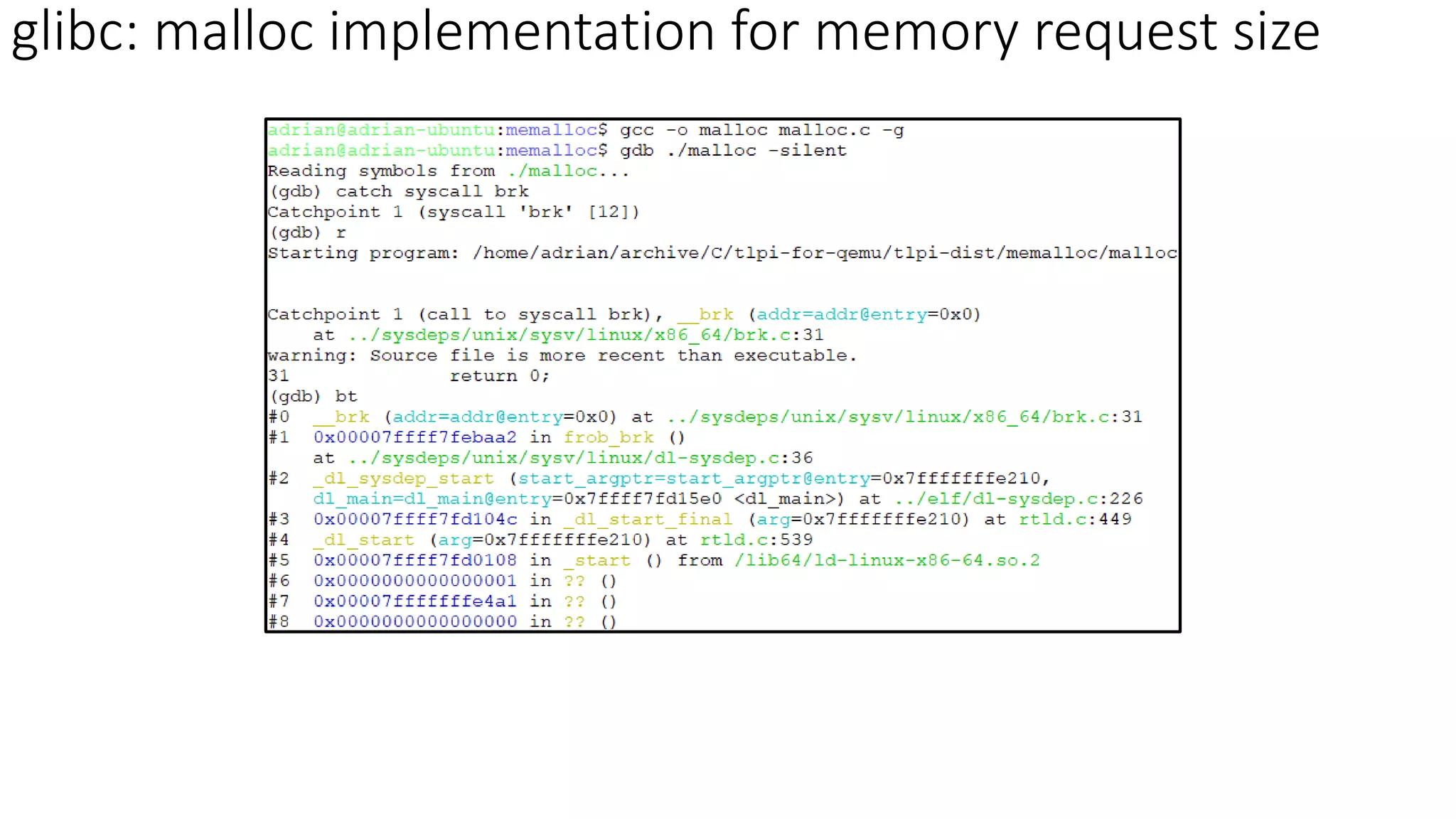
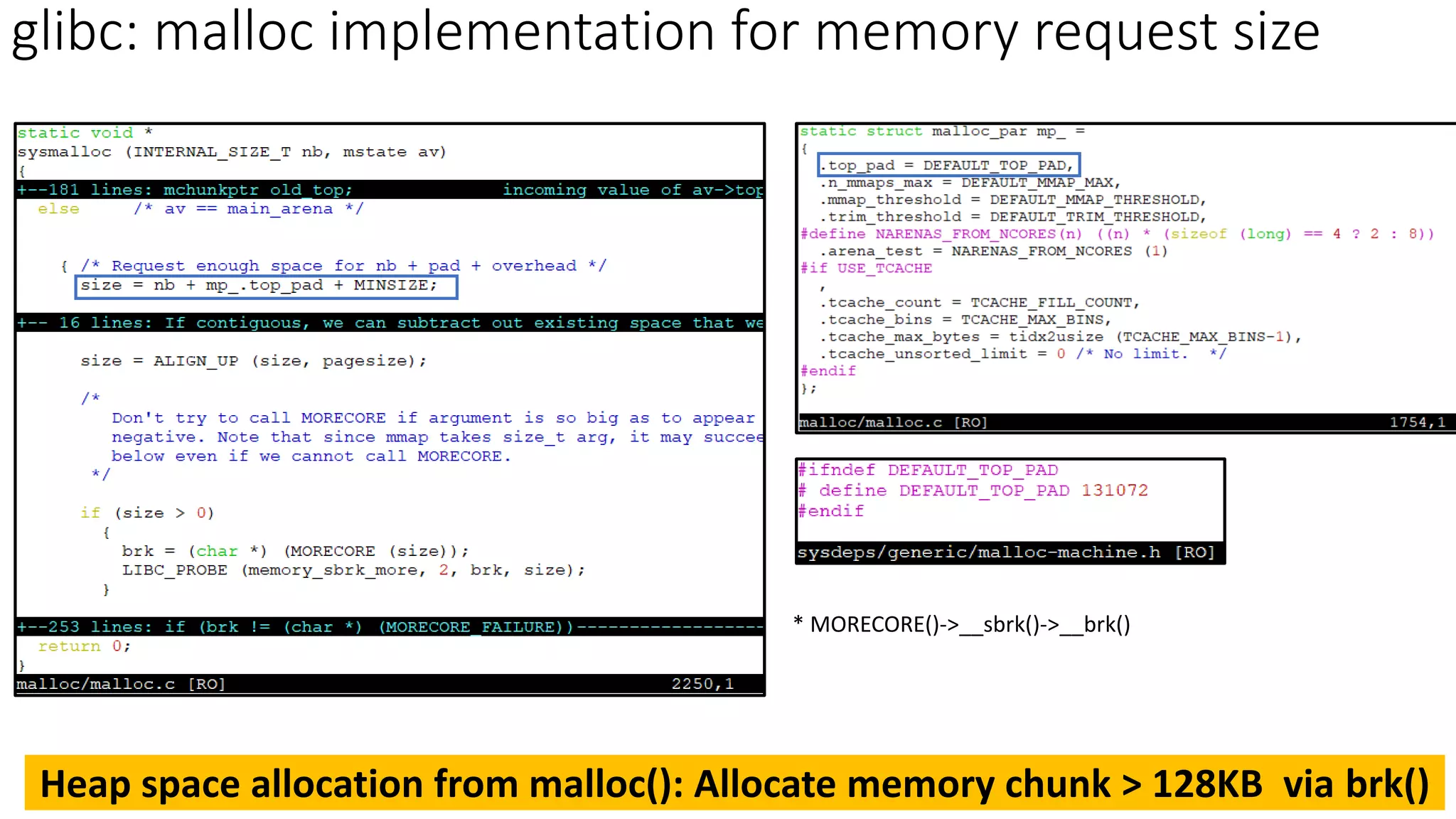
![malloc.c
1
2
3
4
5
6
Heap is expanded for 0x21000 (33 pages): 0x555555559000 -> 0x55555557a000
glibc: malloc implementation for memory request size
Detail Reference
• [glibc] malloc internals
o Concept: Chunk, arenas, heaps, and thread
local cache (tcache)](https://image.slidesharecdn.com/mallocvmallocinlinux-221205070506-74fe014b/75/malloc-vmalloc-in-Linux-30-2048.jpg)

![Kernel Space
0x0000_7FFF_FFFF_FFFF
0xFFFF_8000_0000_0000
128TB
Page frame direct
mapping (64TB)
page_offset_base
64-bit Virtual Address
Kernel Virtual Address
0
0xFFFF_FFFF_FFFF_FFFF
Guard hole (8TB)
LDT remap for PTI (0.5TB)
Unused hole (0.5TB)
vmalloc/ioremap (32TB)
vmalloc_base
Unused hole (1TB)
Virtual memory map – 1TB
(store page frame descriptor)
…
vmemmap_base
page_ofset_base = 0xFFFF_8880_0000_0000
vmalloc_base = 0xFFFF_C900_0000_0000
vmemmap_base = 0xFFFF_EA00_0000_0000
* Can be dynamically configured by KASLR (Kernel Address Space Layout Randomization - "arch/x86/mm/kaslr.c")
Default Configuration
Kernel text mapping from
physical address 0
Kernel code [.text, .data…]
Modules
__START_KERNEL_map = 0xFFFF_FFFF_8000_0000
__START_KERNEL = 0xFFFF_FFFF_8100_0000
MODULES_VADDR
0xFFFF_8000_0000_0000
Empty Space
User Space
128TB
1GB or 512MB
1GB or 1.5GB Fix-mapped address space
(Expanded to 4MB: 05ab1d8a4b36) FIXADDR_START
Unused hole (2MB)
VMALLOC_START = 0xFFFF_C900_0000_0000
VMALLOC_END = 0xFFFF_E8FF_FFFF_FFFF
FIXADDR_TOP = 0xFFFF_FFFF_FF7F_F000
Reference: Documentation/x86/x86_64/mm.rst
64-bit Virtual Address in x86_64](https://image.slidesharecdn.com/mallocvmallocinlinux-221205070506-74fe014b/75/malloc-vmalloc-in-Linux-32-2048.jpg)
![vmalloc
Memory allocation for storing pointers
of page descriptors: area->pages[]
__get_vm_area_node
Allocate a vm_struct from kmalloc (slub allocator)
__vmalloc_node __vmalloc_node_range
Range: VMALLOC_START-VMALLOC_END
kzalloc_node
setup_vmalloc_vm
alloc_vmap_area
1. Allocate a vmap_area struct from
kmem_cache (slub allocator)
2. Get virtual address from vmalloc RB-tree
__vmalloc_area_node
area->pages[i] = page
page = alloc_page(gfp_mask)
for (i = 0; i < area->nr_pages; i++)
page table population
map_kernel_range
Get virtual address from vmalloc RB-tree
(vmap_area RB-tree)
vmalloc – call path
Page table is populated immediately upon the request: No page fault](https://image.slidesharecdn.com/mallocvmallocinlinux-221205070506-74fe014b/75/malloc-vmalloc-in-Linux-33-2048.jpg)
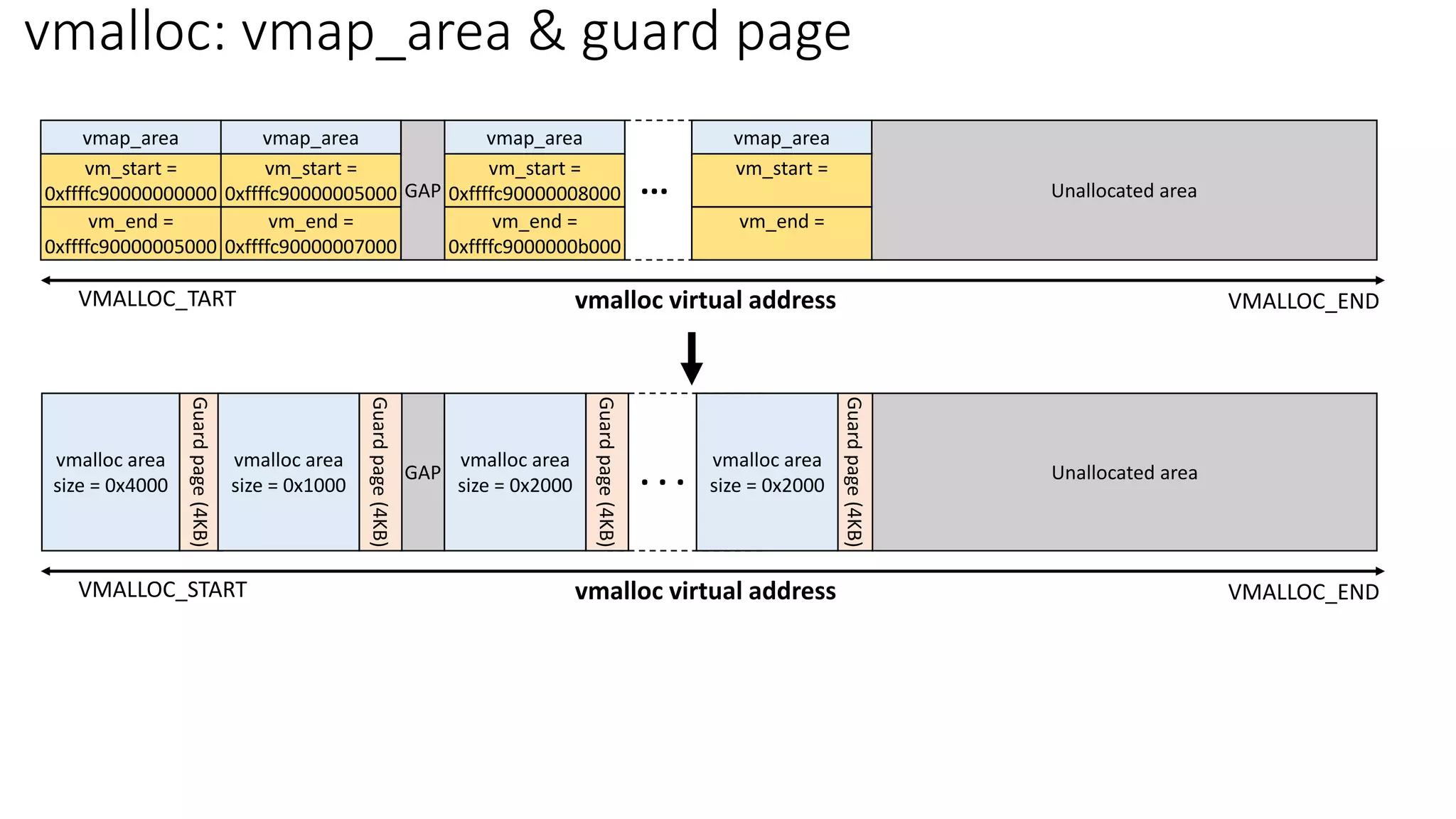
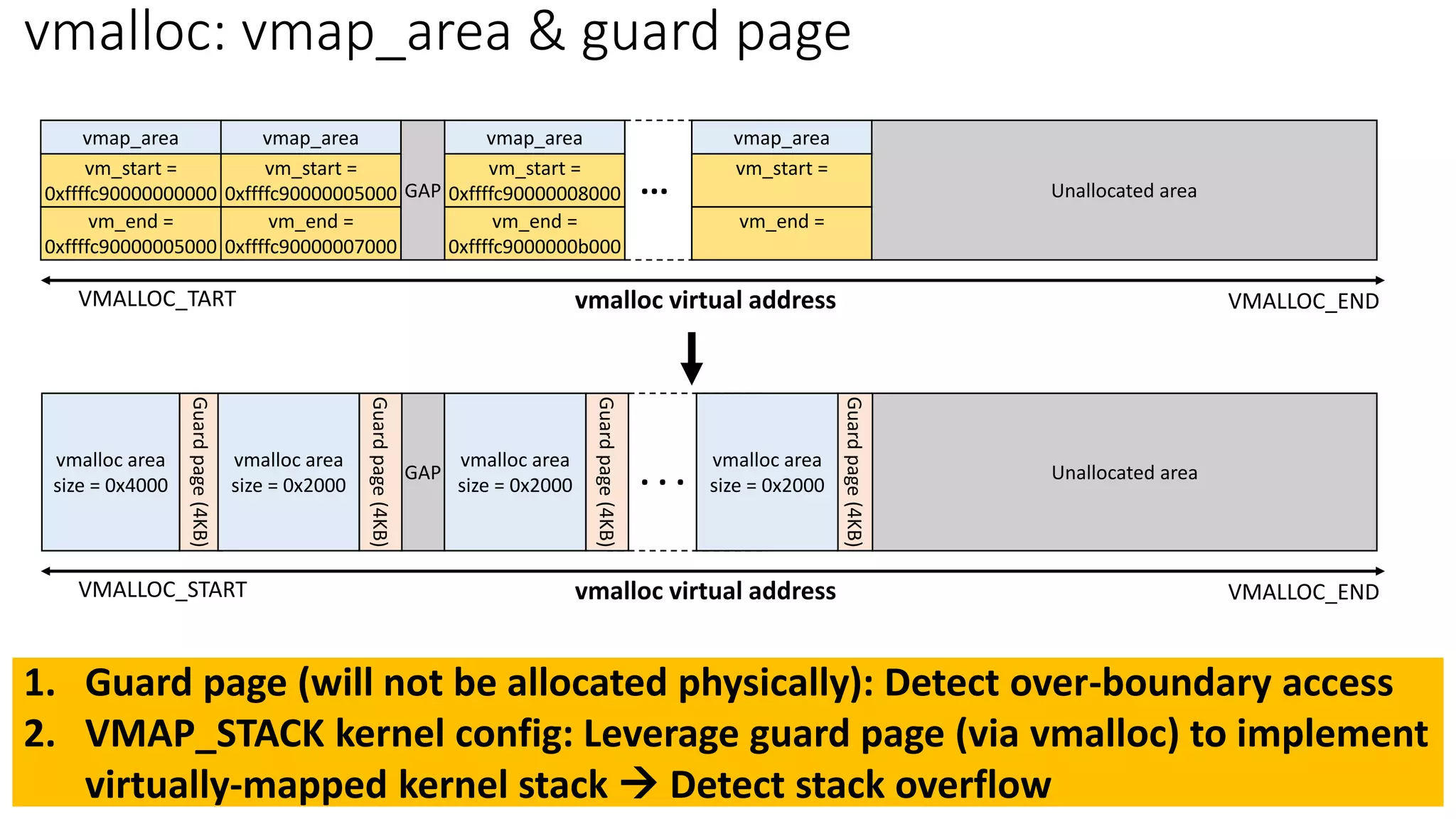
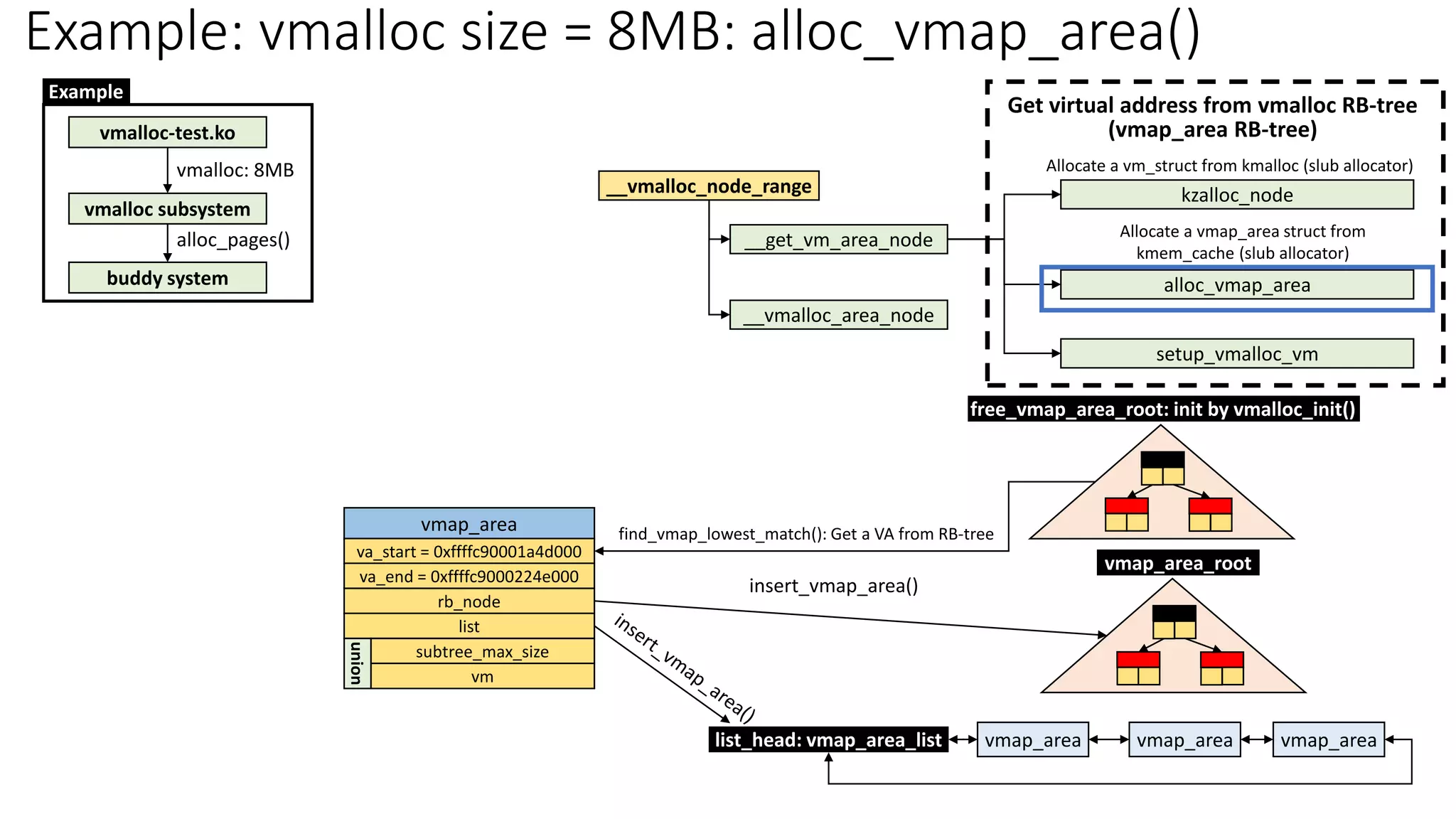
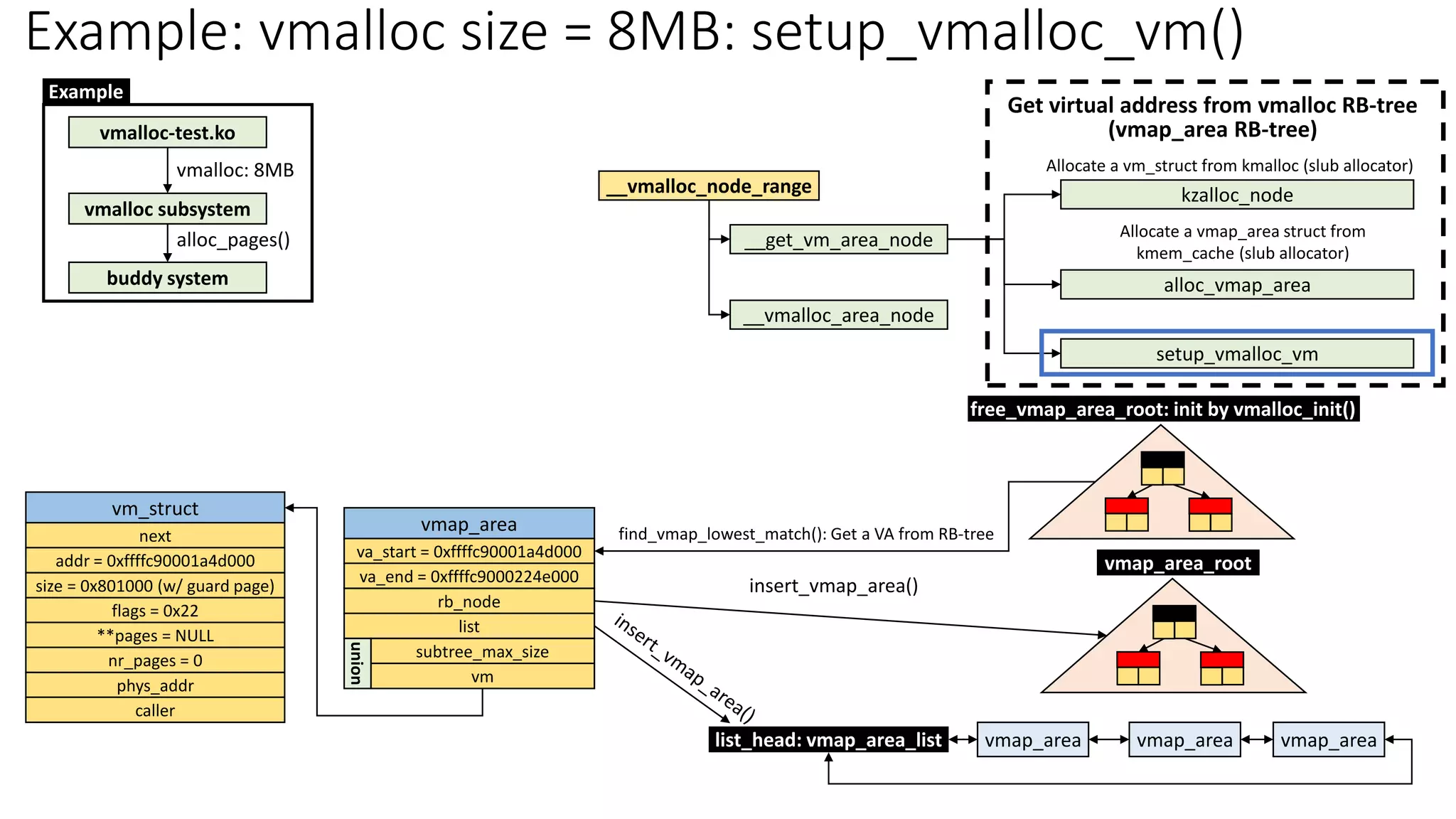
![Example: vmalloc size = 8MB: __vmalloc_area_node()
vmap_area
va_start = 0xffffc90001a4d000
va_end = 0xffffc9000224e000
rb_node
list
subtree_max_size
vm
union
__get_vm_area_node
__vmalloc_node_range
__vmalloc_area_node
find_vmap_lowest_match(): Get a VA from RB-tree
free_vmap_area_root: init by vmalloc_init()
vmap_area_root
list_head: vmap_area_list vmap_area vmap_area vmap_area
vmalloc: 8MB
vmalloc-test.ko
vmalloc subsystem
buddy system
alloc_pages()
Example
vm_struct
next
addr = 0xffffc90001a4d000
size = 0x801000 (w/ guard page)
flags = 0x22
**pages = 0xffffc900019b9000
nr_pages = 0x800 (2048)
phys_addr
caller
Memory allocation for storing pointers
of page descriptors: area->pages[]
area->pages[i] = page
page = alloc_page(gfp_mask)
for (i = 0; i < area->nr_pages; i++)
page table population
map_kernel_range
Page
Descriptor
Page
Descriptor
...
Memory allocation for page descriptor pointer
• size: 8MB/4KB * 8 = 16384 bytes
• Allocated from vmalloc ( > 4KB) or kmalloc
(<= 4KB)](https://image.slidesharecdn.com/mallocvmallocinlinux-221205070506-74fe014b/75/malloc-vmalloc-in-Linux-38-2048.jpg)
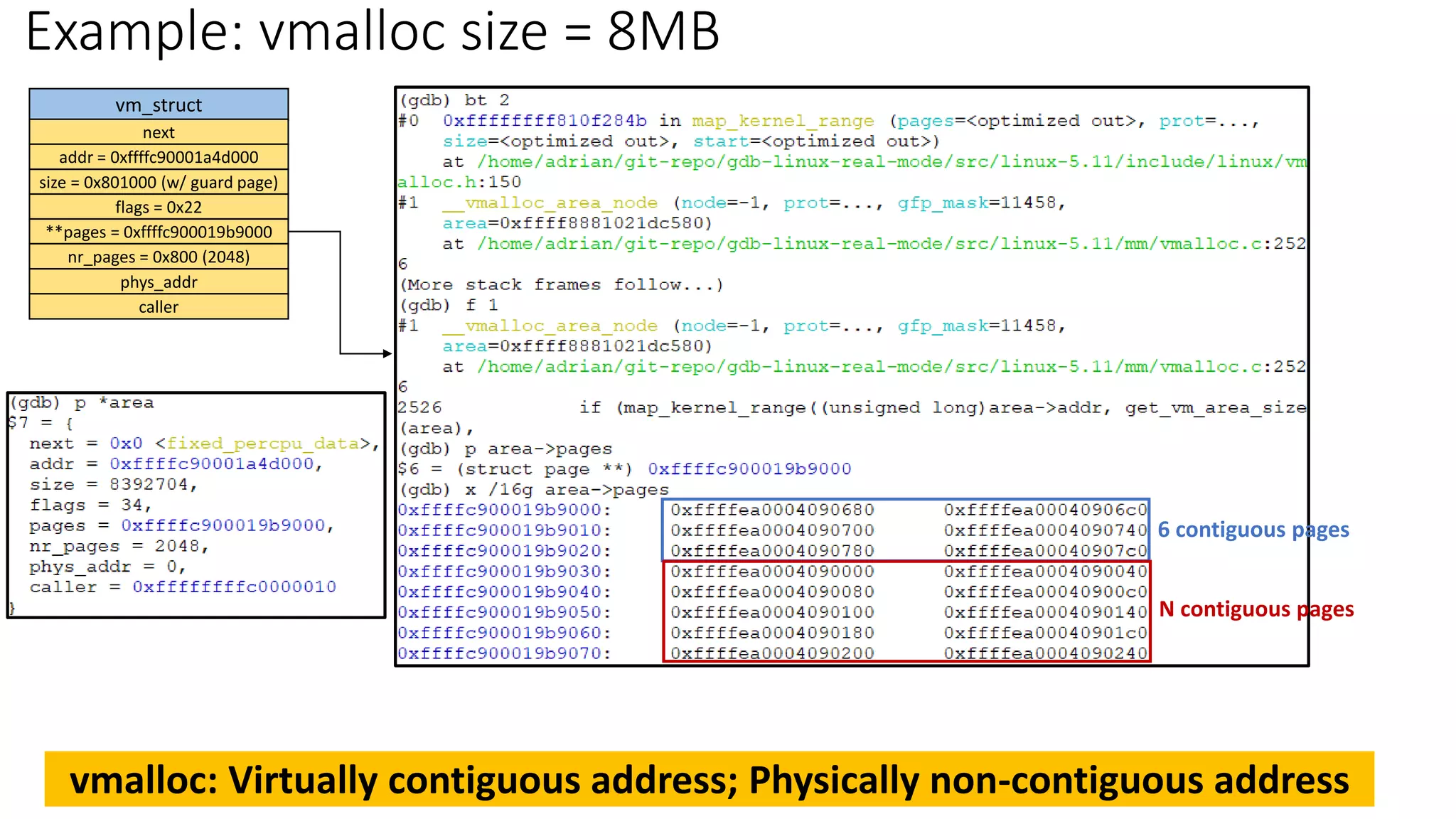
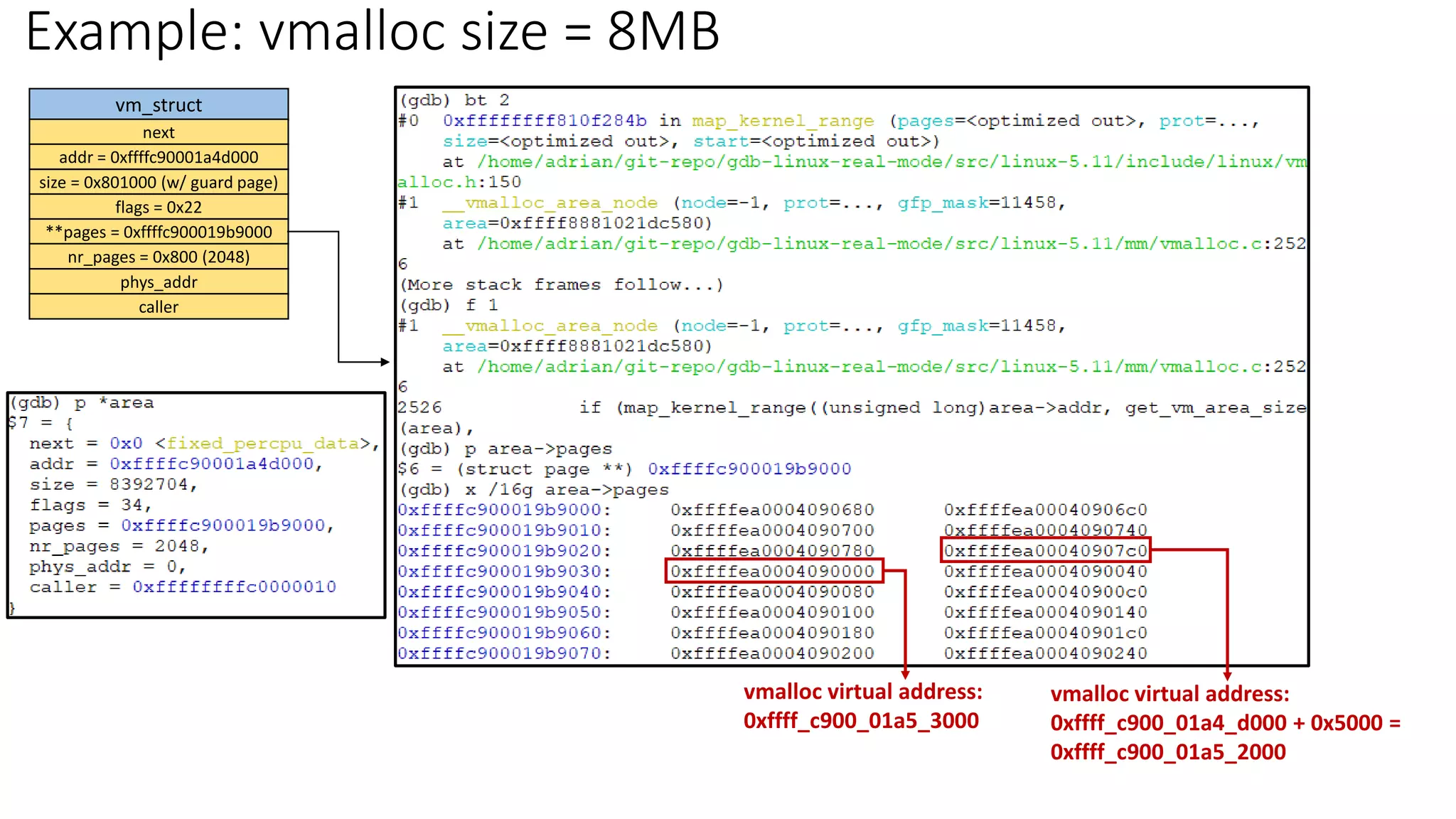
![Page Map
Level-4 Table
40
CR3 init_top_pgt = swapper_pg_dir
Sign-extend
Page Map
Level-4 Offset Physical Page Offset
0
30 21
39 20
38 29
47
48
63
Page Directory
Pointer Offset
Page Directory
Offset
Page Directory
Pointer Table
Page Directory
Table
level3_kernel_pgt
PDPTE #511
PDPTE #510 PDE #506
PDE #507
PDE #505
Direct Mapping Region
Kernel Code & fixmap
cpu_entry_area: 0.5TB
vmalloc: 32TB
PDE #13
PML4E #402
PML4E #273
…
PML4E #465
PML4E #468
PML4E #508
PML4E #511
vmemmap (page
descriptor)
PDPTE #0
Page Table Offset
1211
PTE #82 = 0
PTE #83 = 0
Page Table
Physical Memory
page frame
Example: vmalloc size = 8MB: Page Table Configuration
[Linear Address] 0xffff_c900_01a5_2000, 0xffff_c900_01a5_3000](https://image.slidesharecdn.com/mallocvmallocinlinux-221205070506-74fe014b/75/malloc-vmalloc-in-Linux-41-2048.jpg)
![Page Map
Level-4 Table
40
CR3 init_top_pgt = swapper_pg_dir
Sign-extend
Page Map
Level-4 Offset Physical Page Offset
0
30 21
39 20
38 29
47
48
63
Page Directory
Pointer Offset
Page Directory
Offset
Page Directory
Pointer Table
Page Directory
Table
level3_kernel_pgt
PDPTE #511
PDPTE #510 PDE #506
PDE #507
PDE #505
Direct Mapping Region
Kernel Code & fixmap
cpu_entry_area: 0.5TB
vmalloc: 32TB
PDE #13
PML4E #402
PML4E #273
…
PML4E #465
PML4E #468
PML4E #508
PML4E #511
vmemmap (page
descriptor)
PDPTE #0
Page Table Offset
1211
PTE #82
PTE #83
Page Table
Physical Memory
page frame
Example: vmalloc size = 8MB: Page Table Configuration
[Linear Address] 0xffff_c900_01a5_2000, 0xffff_c900_01a5_3000
page frame](https://image.slidesharecdn.com/mallocvmallocinlinux-221205070506-74fe014b/75/malloc-vmalloc-in-Linux-42-2048.jpg)
![Page Map
Level-4 Table
40
CR3 init_top_pgt = swapper_pg_dir
Sign-extend
Page Map
Level-4 Offset Physical Page Offset
0
30 21
39 20
38 29
47
48
63
Page Directory
Pointer Offset
Page Directory
Offset
Page Directory
Pointer Table
Page Directory
Table
level3_kernel_pgt
PDPTE #511
PDPTE #510 PDE #506
PDE #507
PDE #505
Direct Mapping Region
Kernel Code & fixmap
cpu_entry_area: 0.5TB
vmalloc: 32TB
PDE #13
PML4E #402
PML4E #273
…
PML4E #465
PML4E #468
PML4E #508
PML4E #511
vmemmap (page
descriptor)
PDPTE #0
Page Table Offset
1211
PTE #82
PTE #83
Page Table
Physical Memory
page frame
Example: vmalloc size = 8MB: Page Table Configuration
[Linear Address] 0xffff_c900_01a5_2000, 0xffff_c900_01a5_3000
page frame
Page are physically non-
contiguous address](https://image.slidesharecdn.com/mallocvmallocinlinux-221205070506-74fe014b/75/malloc-vmalloc-in-Linux-43-2048.jpg)
![Page Map
Level-4 Table
40
CR3 init_top_pgt = swapper_pg_dir
Sign-extend
Page Map
Level-4 Offset Physical Page Offset
0
30 21
39 20
38 29
47
48
63
Page Directory
Pointer Offset
Page Directory
Offset
Page Directory
Pointer Table
Page Directory
Table
level3_kernel_pgt
PDPTE #511
PDPTE #510 PDE #506
PDE #507
PDE #505
Direct Mapping Region
Kernel Code & fixmap
cpu_entry_area: 0.5TB
vmalloc: 32TB
PDE #13
PML4E #402
PML4E #273
…
PML4E #465
PML4E #468
PML4E #508
PML4E #511
vmemmap (page
descriptor)
PDPTE #0
Page Table Offset
1211
PTE #82
PTE #83
Page Table
Physical Memory
page frame
Example: vmalloc size = 8MB: Page Table Configuration
[Linear Address] 0xffff_c900_01a5_2000, 0xffff_c900_01a5_3000
page frame
verify this](https://image.slidesharecdn.com/mallocvmallocinlinux-221205070506-74fe014b/75/malloc-vmalloc-in-Linux-44-2048.jpg)
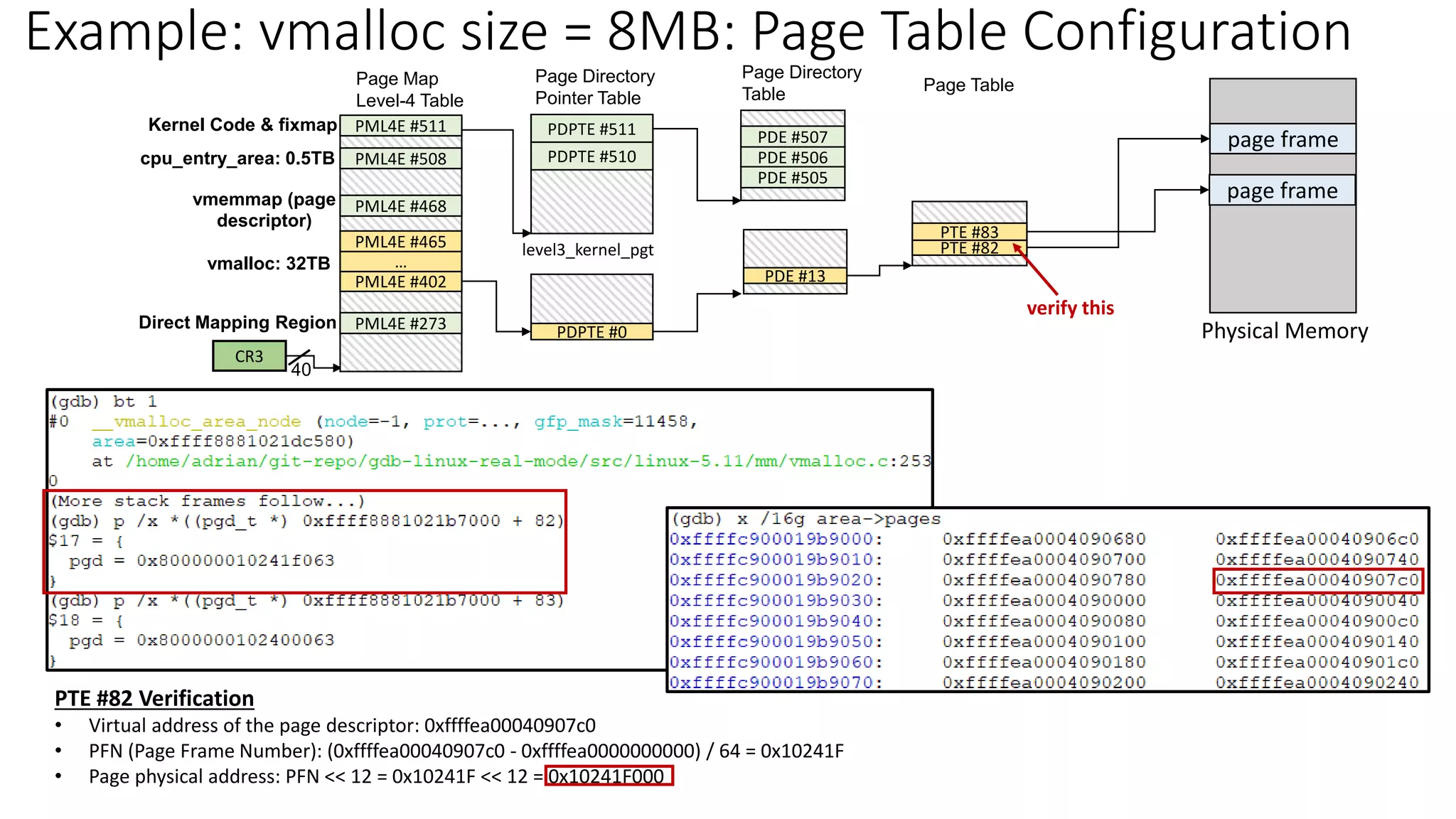
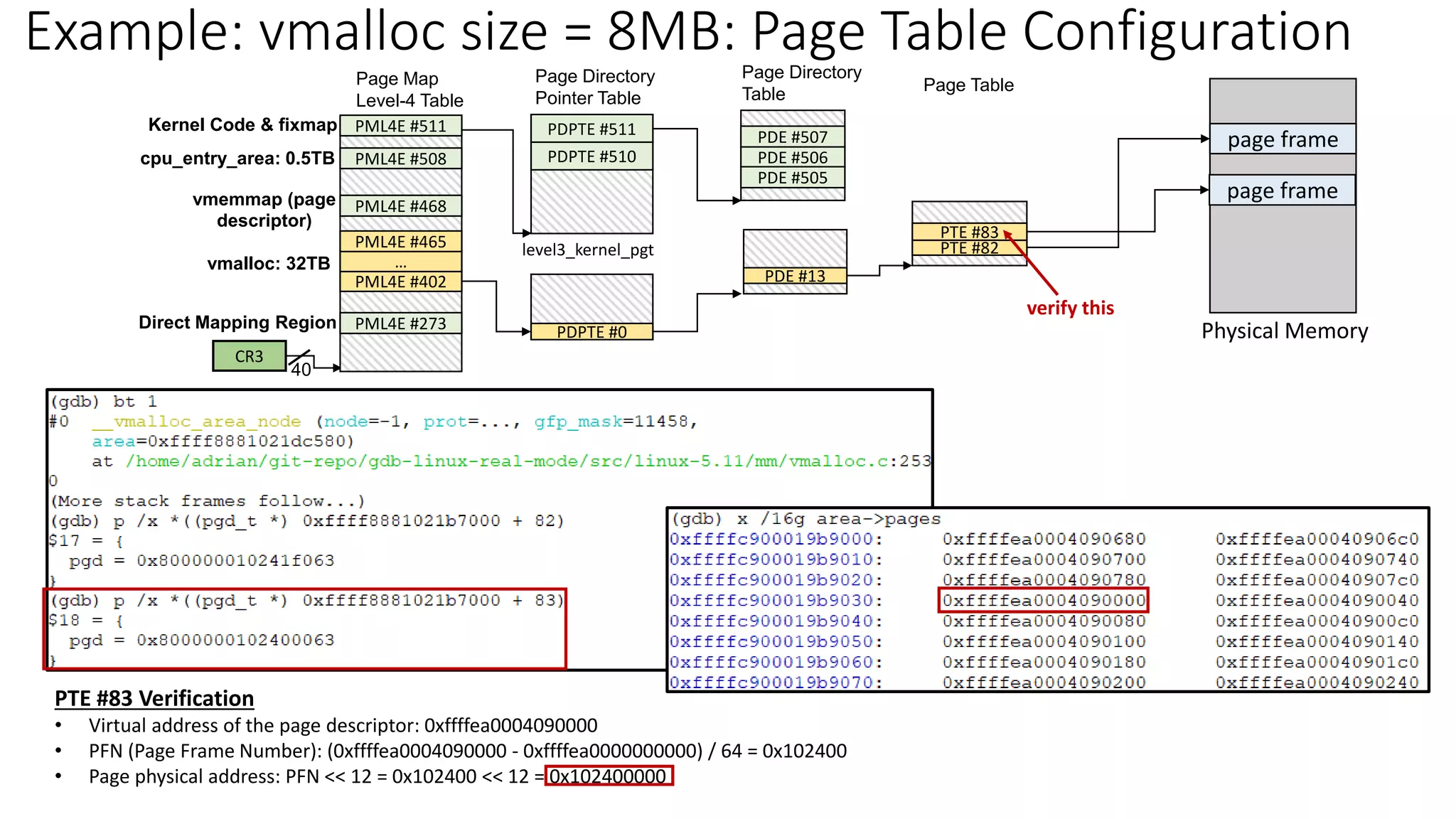
![• Array size > PAGE_SIZE (4KB)
oarr[0], arr[1]….arr[n] → Need contiguous memory for array indexing
oExample: 8MB memory allocation (for page descriptor) from vmalloc
▪ Page descriptor list (vm_struct->pages) requires contiguous memory for array indexing
vmalloc users/scenario
vm_struct
next
addr = 0xffffc90001a4d000
size = 0x801000 (w/ guard page)
flags = 0x22
**pages = 0xffffc900019b9000
nr_pages = 0x800 (2048)
phys_addr
caller
Page
Descriptor
Page
Descriptor
...
Memory allocation for page descriptor
pointer
• Memory space can be address:
8MB/4KB * 8 = 16384 bytes
• Allocated from vmalloc ( > 4KB)](https://image.slidesharecdn.com/mallocvmallocinlinux-221205070506-74fe014b/75/malloc-vmalloc-in-Linux-47-2048.jpg)
